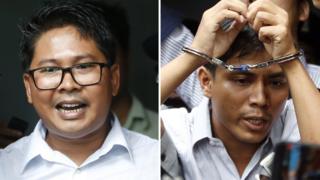 Image copyright EPA Image caption The verdict against Wa Lone (L) and Kyaw Soe Oo (R) has been widely condemned
Image copyright EPA Image caption The verdict against Wa Lone (L) and Kyaw Soe Oo (R) has been widely condemned
The jailing of two Reuters reporters in Myanmar has left the journalism community asking whether their former rights champion has turned her back on a free press, writes the BBC’s Nick Beake in Yangon.
For the journalists of Yangon this is personal.
Many were close friends of Wa Lone and Kyaw Soe Oo. And many now feel one false move and they could be joining them in the notorious Insein prison here in Myanmar’s former capital.
“Insane” is how the jail is pronounced, and for many in the press, it reflects a chaotic legal farce which has played out over the past nine months – one that’s culminated in two young journalists being found to have been useful to “enemies of the state” and handed a seven year prison sentence.
Reuters journalists jailed over secrets act
Not that their wives regret their choice of careers. Not for one moment.
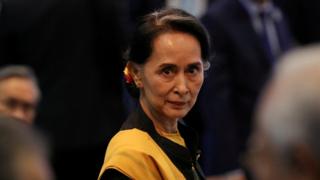 Image copyright Reuters Image caption Aung San Suu Kyi has also been accused of ignoring violence against the Rohingya
Image copyright Reuters Image caption Aung San Suu Kyi has also been accused of ignoring violence against the Rohingya
“I loved and respected her so much,” Pan Ei Mon said. “But she said our husbands were not reporters because they violated the nation’s secrets, and I am very devastated by that.”
Reporters held ‘for investigating killings’ What next for Myanmar after damning report? Seeing through the official story in Myanmar
Ms Suu Kyi used to champion the rights of journalists. She certainly benefited from their coverage of her long fight for democracy while she suffered years of house arrest.
When it was time for my own question to the wives, I asked what their message to Ms Suu Kyi would be – as someone who the Burmese authorities had also kept apart from the man she loved (her late British husband Michael Aris).
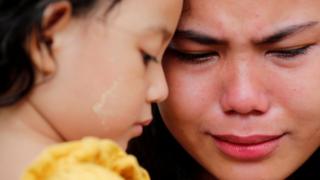 Image copyright Reuters Image caption Chit Su Win fights back tears as she hugs her daughter, Moe Thin Wai Zan
Image copyright Reuters Image caption Chit Su Win fights back tears as she hugs her daughter, Moe Thin Wai Zan
Chit Su Win told me she’d rather address her mother to mother.
“My daughter asks me – doesn’t daddy love me anymore? Doesn’t daddy live with us anymore?”
“As a mother, I feel devastated. I tell her daddy is working. I try to be strong for my daughter. I feel very depressed, but I steel myself, because if I am depressed, who will care for my daughter?”
‘All of you are at risk’
As the mother of the nation, Ms Suu Kyi generated huge hope when her National League for Democracy (NLD) party triumphed in free elections in 2012, after five decades of brutal military rule.
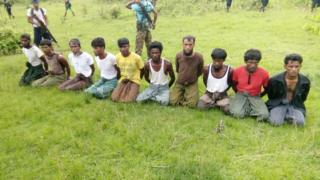 Image copyright Reuters Image caption These are the men whose deaths the Reuters journalists were investigating
Image copyright Reuters Image caption These are the men whose deaths the Reuters journalists were investigating
One of the many painful ironies of this case is that the army later admitted its soldiers were culpable.
The military’s wider crackdown on what it called Bengali “terrorists” last autumn – following attacks on security posts – forced three quarters of a million Rohingya into neighbouring Bangladesh. They remain there in the sprawling and depressing camps of Cox’s Bazaar.
Who are the Rohingya? The story not being talked about in Myanmar 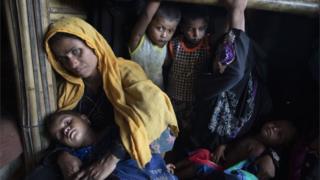 Image copyright Getty Images Image caption More than 700,000 Rohingya have fled violence in Myanmar in the last year
Image copyright Getty Images Image caption More than 700,000 Rohingya have fled violence in Myanmar in the last year
Last week in a blistering assessment, UN inspectors said the top generals should stand trial for genocide and accused Ms Suu Kyi of failing to use her “moral authority” to stop the violence.
Myanmar rejects UN ‘genocide’ accusation Blow by blow: How a ‘genocide’ was investigated
Now Ms Suu Kyi’s accused of failing to stand up for reporters, as well as the Rohingya.
“All of you are at risk,” Khin Maung Zaw, the leading lawyer for the Reuters pair told the hushed room of journalists back at the press conference.
He declared the verdict a black day for Myanmar and a major setback for a free press and the country’s transition to democracy.
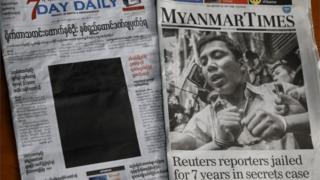 Image copyright EPA Image caption The 7Day Daily paper printed a black front page after the journalists verdict was announced
Image copyright EPA Image caption The 7Day Daily paper printed a black front page after the journalists verdict was announced
Many wonder who will be next.
Aung Naing Soe is one Burmese journalist who knows what it’s like to feel the heat of the regime in the new Suu Kyi era. Earlier this year he served a two month sentence for operating a drone near the parliament in the capital, Naypyidaw.
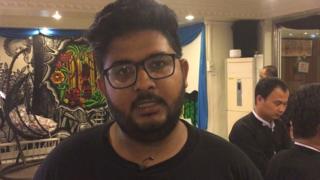 Image caption Aung Naing Soe says the jailing of the Reuters journalist was “personal”
Image caption Aung Naing Soe says the jailing of the Reuters journalist was “personal”
“It’s really heartbreaking for us to come and cover this kind of event” he tells me.
“I do not want to see tears from the wives of these journalists anymore. We have covered a lot of heartbreaking things but this is more personal. They are my colleagues, my friends.”
Suu Kyi ‘should have resigned’ on Rohingya
He’s worried that the public has been poisoned against journalists by online campaigns which characterise them as “betrayers of the state” and that there will be no popular backlash against any further attacks on the freedom of the press.
In some countries, Wa Lone and Kyaw Soe Oo would have been given a prize for their investigative journalism. Not here. Not in Suu Kyi’s Myanmar.
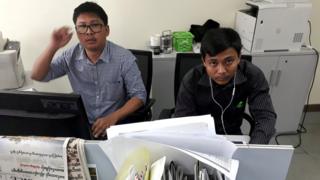 Image copyright Reuters Image caption Wa Lone (L) and Kyaw Soe Oo have continually maintained their innocence
Image copyright Reuters Image caption Wa Lone (L) and Kyaw Soe Oo have continually maintained their innocence
As state counsellor, a role she created for herself because the 2008 Constitution denies her the presidency, Ms Suu Kyi runs Myanmar’s NLD civilian government.
She has the power to issue a pardon and set these journalists free. If she’s even considering that, she certainly hasn’t shown it.
Su Myat Mon is a reporter who focuses on women’s rights and social affairs.
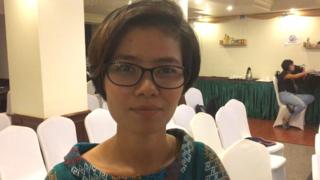 Image caption Su Myat Mon says being a journalist in today’s Myanmar does frighten her
Image caption Su Myat Mon says being a journalist in today’s Myanmar does frighten her
“I was extremely disappointed with the verdict and with the NLD too. They’re a democratic government. They used to believe the media was for something, that it did something positive for democracy.”
Is she scared to be a journalist in Myanmar now?
“It does make me frightened,” she replies.
“I can be arrested at any time if the government doesn’t like my reports. This verdict affects me: my emotions and the work I do.”
Would she consider giving up the job, I venture? Su Myat Mon looks at me straight in the eye:.
“I love this job. I may fear being arrested, but I still have my spirit. And, don’t forget, there’s nothing wrong with being a journalist. It is not a crime.”






